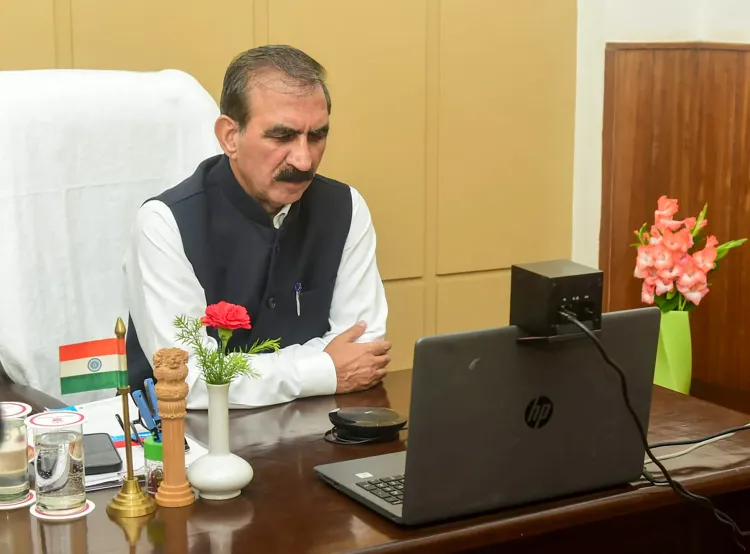Is the Development Model for Hill States Sustainable Ahead of PM Modi's Meeting?

Synopsis
Key Takeaways
- CM Sukhu advocates for a sustainable development model.
- PM Modi's visit highlights the importance of disaster response.
- Himachal Pradesh faces significant losses from recent floods.
- Survivors symbolize hope amid tragedy.
- The NDRF's role is crucial in disaster management.
Kangra (Himachal Pradesh), Sep 9 (NationPress) Just hours prior to his meeting with Prime Minister Narendra Modi, Himachal Pradesh Chief Minister Sukhvinder Singh Sukhu expressed his intention to discuss the sustainability of the development model employed in hill states. He underscored the necessity for a framework that ensures the protection and safety of mountainous regions.
In his message on X, he advocated for the creation of a national strategy aimed at sustainable development in hill states to safeguard the mountains from degradation. The Chief Minister conveyed, “The residents are eagerly awaiting the PM’s visit to Himachal at a time when our state is grappling with unprecedented destruction due to the recent monsoons. The picturesque Himachal is currently enduring the sorrow of losing loved ones, entire villages buried under debris, and significant damage to infrastructure such as roads and electricity supply. Himachal has borne immense suffering since 2023,” he noted.
Referring to the Prime Minister as a protector of the nation, the Chief Minister remarked, “One crucial point I will present to the PM is whether the development model applied in hill states is indeed sustainable.”
“The broader issue is determining how we can shield the mountains from the detrimental effects of climate change. We require a sustainable development model that can safeguard the state’s natural resources and ensure the mountains remain protected,” CM Sukhu articulated.
Upon his arrival in Dharamsala, where the Prime Minister will be visiting, the Chief Minister remarked on an exhibition put together by the National Disaster Response Force (NDRF).
“The exceptional efforts being made by the NDRF in disaster management within a state facing harsh natural conditions are praiseworthy,” the Chief Minister stated in another post on X.
Prime Minister Modi is set to visit flood-affected areas in Punjab and Himachal Pradesh to evaluate the ongoing disaster response and recovery operations following severe floods and landslides caused by the monsoon, which have caused widespread devastation across northern India.
An official familiar with the visit informed IANS that at Gaggal airport near Kangra, where the Prime Minister is expected around 2 p.m., he will meet with 21 survivors of recent landslides and flash floods.
Among them is eleven-month-old Neetika, who is currently in the care of relatives and is the only survivor from her family after the July catastrophe that devastated the hill state, leaving many families without homes and tourists stranded.
Her presence, fragile yet resilient, has come to embody both the tragedy and the miracle of survival.
For Himachal Pradesh, she represents a calamity that cannot be quantified by statistics. At the airport, the Prime Minister will also lead a meeting with state and central government officials to assess the damage and evaluate losses incurred due to natural disasters.
Alongside Chief Minister Sukhu, senior BJP leaders, including Leader of Opposition Jairam Thakur and state party chief Rajeev Bindal, are scheduled to participate in the meeting.
PM Modi plans to conduct an aerial survey of Mandi, Kullu, and Chamba, the districts most severely impacted by the disaster.
Before departing for the two states, PM Modi posted on X, “I am heading to Himachal Pradesh and Punjab to assess the situation following the floods and landslides. The Government of India stands firmly with those affected during this tragic period.”
Chief Minister Sukhu reported that the state has incurred losses exceeding Rs 5,000 crore, with the majority of damage occurring to the National Highways Authority of India (NHAI) highways. Additionally, state roads have suffered significant impacts.
Alarming visuals of landslides engulfing several multi-storey buildings and hundreds of individuals being evacuated, alongside rescuers searching for those feared missing, were prevalent during the calamities of July, August, and September, which resulted in 371 fatalities, 41 individuals missing, and extensive infrastructure damage throughout the state.





